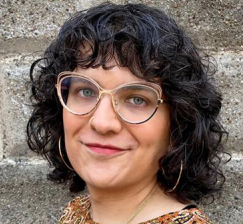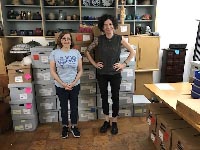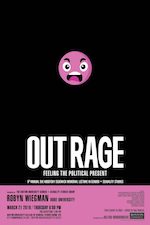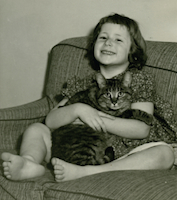BLOG
2021 DUKE QUEER THEORY LECTURE IN HONOR OF EVE KOSOFSKY SEDGWICK
Duke’s annual Queer Theory Lecture in Honor of Eve Kosofsky Sedgwick was given on Thursday, October 14, 2021 by Dr. Jules Gill-Peterson. Dr. Peterson’s talk was titled “Queer Theory Killed Venus Xtravaganza: What’s Trans About Queer Studies Now?” The talk can be viewed online here.
Jules Gill-Peterson is Associate Professor of English and Gender, Sexuality, and Women’s Studies at the University of Pittsburgh. Jules is the author of Histories of the Transgender Child (University of Minnesota Press, 2018) and is currently at work on a book project entitled Gender Underground: A History of Trans DIY.
RELATED - EVENTS
JULY 2020: EVE KOSOFSKY SEDGWICK’S ARCHIVE MOVES TO DUKE
The Sallie Bingham Center for Women’s History & Culture in Duke University’s Rubenstein Library is now the permanent home for the archive of Eve Kosofsky Sedgwick. When Sedgwick died in 2009, the contents of her archive were inherited by H. A. Sedgwick, who has donated them to Duke.
Over the past decade, the books, papers, and artworks comprising the archive have been meticulously organized and documented, principally by Sarah McCarry, working first with H. A. Sedgwick and later with the Eve Kosofsky Sedgwick Foundation. During this time, the process of selecting a new home for the archive was going on. Many highly suitable institutions expressed interest in housing it, especially after Jane Hu’s article about it appeared in the New Yorker. Duke stood out because of its superb facilities and staff; because of the inter-disciplinary cooperation among their special collections, which is well-suited to the breadth of Sedgwick’s interests and activities; and most of all because of the sustained yet patient enthusiasm of Laura Micham, who is the Merle Hoffman Director of the Sallie Bingham Center.
Once a gift agreement had been signed last summer, and moving arrangements had been made, Micham and McCarry, working together in Sedgwick’s studio over the course of a week, prepared the 73 boxes of materials, some of which are shown in this photo (with Micham on the left and McCarry on the right). Everything was palletized and trucked to Durham, North Carolina, where it is now safely housed in the storage facility of Duke’s library, and intake processing has begun. This material joins 8 boxes of papers that Sedgwick had left at Duke when she moved to the The Graduate Center at the City University of New York.
With the disruptions caused by COVID-19, it is not possible at present to say exactly when, but it is hoped that the Eve Kosofsky Sedgwick archive will be ready to receive visitors by sometime in 2021. An announcement will be made, and further information, including a collection description and a finding aid, will be available at that time.
RELATED - EVENTS
ROBYN WIEGMAN PRESENTS THE NINTH ANNUAL EVE KOSOFSKY SEDGWICK LECTURE AT BOSTON UNIVERSITY
The Ninth Annyal Eve Kosofsky Sedgwick Lecture at Boston University, titled “Outrage” and presented by Robyn Wiegman, is available to watch online here.
Robyn Wiegman is Professor of the Programs in Literature and Gender, Sexuality, and Feminist Studies, and former Margaret Taylor Smith director of Women’s Studies at Duke University (2001-2007).
RELATED - EVENTS
MARCH 29, 2018: DEAN SPADE WILL PRESENT THE EIGHTH ANNUAL EVE KOSOFSKY SEDGWICK MEMORIAL LECTURE AT BOSTON UNIVERSITY
Dean Spade, Associate Professor of Law at Seattle University, will give this year’s lecture in the Honoring Eve series, organized by the Boston University Gender + Sexuality Studies Group. They describe the lecture, “How Social Movements Feel,” as follows:
“As organizers know, social movements are made of relationships. While efforts to dismantle, reform, and reimagine are often focused on critical analysis and material outcomes, much of what determines the impacts of social movements are the social relations, conflicts, and emotional capacities of participants. In conversation with the work of Eve Sedgwick, Dean Spade will explore questions facing contemporary movements about our being together.”
As described in his faculty profile, Professor Spade “founded the Sylvia Rivera Law Project www.srlp.org, a non-profit law collective that provides free legal services to transgender, intersex and gender non-conforming people who are low-income and/or people of color. SRLP also engages in litigation, policy reform and public education on issues affecting these communities.” Spade was a Williams Institute Law Teaching Fellow at UCLA, and has taught classes at Columbia and Harvard Law Schools.
A video of Professor Spade’s talk will be posted on BU’s Honoring Eve website.
RELATED - EVENTS
BATHROOM SONGS - EVE KOSOFSKY SEDGWICK AS A POET, EDITED BY JASON EDWARDS
We are delighted to announce that Jason Edwards has edited a collection of essays based on a symposium examining the poetry of Eve Kosofsky Sedgwick, and including many of her previously uncollected poems. The book’s publisher describes it as follows:
"Bathroom Songs: Eve Kosofsky Sedgwick as a Poet is the first book of essays to consider the poetry of one of the twentieth- and early twenty-first-century’s most important literary, affect, and queer theorists. Acclaimed as one of the “truly innovative” poets of her generation by Maud Ellmann, Sedgwick’s work as a poet is, perhaps, less well known, but is no less compelling than her ground-breaking trilogy of queer theoretical texts: Between Men: English Literature and Male Homosocial Desire, Epistemology of the Closet, and Tendencies.
“The book includes seven specially commissioned essays considering Sedgwick’s published poetry and writing about poets, by Angus Brown, Meg Boulton, Mary Baine Campbell, Jason Edwards, Kathryn R. Kent, Monica Pearl, and Benjamin Westwood, that range across the complete range of Sedgwick’s work, from her earliest published lyrics through her first collection of poetry, Fat Art, Thin Art, to her part-haiku, part-prose autobiography, A Dialogue on Love, and beyond. In addition, the book contains over forty of Sedgwick’s previously uncollected poems, ranging from her earliest poem on T.E. Lawrence to her final poem ‘Death’, introduced and contextualized by Edwards.”
Bathroom Songs is published by punctum books.




